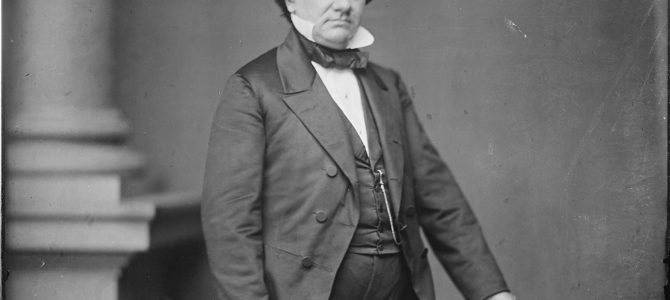
The man who went head-to-head against The Great Emancipator may seem like an obvious slavery apologist. But Stephen Douglas did not advocate slavery. He merely wanted each state to choose for itself. He believed popular sovereignty in the states could settle the issue and avert civil war. He was a pseudo-forerunner of the pro-choice movement, and his arguments should not be forgotten.
In the mid-1800s, the great debate raged over slavery and westward expansion. The Missouri Compromise sought to resolve the matter by designating a line where slavery might exist on one side and not the other.
A prominent statesman, Douglas saw the Missouri Compromise as an affront to the noble American goal of self-government. He was committed to federalism and believed the people in every state should decide on slavery for themselves, without federal dictates. He wanted the option for slavery. He wanted choice.
We rightly view this today as egregious. It is not choice if the slave has no say! The slave is a distinct, living, and whole human being. Empowering a group with the choice of another’s freedom is the definition of tyranny. Human freedom must be beyond the reach of democracy, out of the hands of the oppressive mob.
Douglas’s racism is what sustained his view that slavery was merely a public policy issue to be settled by choice in the states. He genuinely believed black people were an “inferior race” and “below the capacity for self-government.”
Likewise, many today view the unborn as inferior, advancing the idea that abortion is merely a public policy choice. Hiding behind the pro-choice view is revolting when applied to slavery, and it should be equally so for abortion. There are no innate degrees of superiority. Human life should not be subject to another’s whim.
Yes, It’s a Person, But That Person Gets No Rights
Douglas thought himself enlightened for wanting to reserve choice for the people. But there is little daylight between his personal view of choice and his approval if people actually chose slavery. We would likely say he is a bigot merely for supporting the choice that slavery might exist. Indeed, he must have condoned the outcome by advocating choice.
Honest pro-choicers today recognize the unborn has his or her own body, human DNA and all. They merely believe that it should not have rights. This honest view is a mirror image of Douglas’s view that “I do not acknowledge that the negro must have civil and political rights everywhere or nowhere.” By his standard, state choice endowed legitimacy upon any outcome.
The pro-choice philosophy diverges marginally from Douglas’s slavery-choice position. Whereas he sought to give states the choice to welcome or reject slavery, today’s pro-choice movement seeks to empower individual women with the choice to keep or kill.
The distinction over who infringes upon another’s life is not significant, as our individual liberty extends only until it harms another person. No state can legitimately persecute a class of its people, and no individual should either.
For slavery, only a federal ban could safeguard our national dedication to liberty. Federalism simply was not enough to resolve this affront to human dignity, when popular sovereignty would provide cover for majority oppression of a minority.
Under the equal protection of law, no class of persons can be discriminated against categorically, as with slavery. But the unborn are also a whole class of persons, categorically discriminated against by the abortion regime. So even federalism cannot resolve this issue on its face if states can choose to continue such discrimination.
Does Choice Itself Determine What Is Right or Wrong?
Federalism does play an important role in the debate, and allows for robust self-government and diversity of policy. Douglas was making a salient point about federalism and the honorable experiment of self-government. The problem was that his point about slavery could only be sustained by fallacy, and he cited false analogies to uphold it.
He made his points most articulately in Chicago on July 9, 1858. “My object,” he stated, citing the Kansas-Nebraska Act he authored, “was to secure the right of the people of each State…to decide the question for themselves, to have slavery or not, just as they chose.”
The choice rhetoric is further developed by his view that he would “deny the right of Congress to force a slaveholding State upon an unwilling people” and “deny their right to force a free State upon an unwilling people.” Moving past his ironic use of “unwilling” in discussing slavery, his point holds that states should choose policy and be free from federal compulsion.
Douglas did anticipate the argument of morality: “It is no answer to this argument to say that slavery is an evil, and hence should not be tolerated.” Choice, he believed, should determine what is evil. This moral relativism argues that a thing is evil only if enough people agree. This is the very reason that categorical protections in law exist outside of democratic rule: to prevent the majority from oppressing a minority. Douglas could not see past his own racism, and abortion apologists cannot seem to recognize categorical discrimination.
To hold up his choice argument, he said states should “decide for themselves whether they desire a Maine liquor law or not…what kind of common schools…what system of banking…” These are plainly false analogies. Generally applicable laws differ from class-based discriminatory ones, particularly when that class has no vote.
But even if they had a vote, it would not make popular sovereignty any more legitimate for slavery or abortion. The people must give up some of their sovereignty to natural law. Hold votes on liquor policy or schools, but votes should be powerless against God’s law, that man be free from unjust bondage and death.
Douglas finished this section of his argument by stating, “Whenever you put a limitation upon the right of any people to decide what laws they want, you have destroyed the fundamental principle of self-government.” This brilliant federalism conclusion misses the mark. Self-government is a means to achieve a more perfect union, and cannot be premised upon such inherent injustice as subjugation of whole classes of people.
Federalism Is No Answer to Great Moral Questions
To the dismay of Douglas’s legacy, the federal government has frequently thrust policy upon unwilling states. Abortion is legal across the entire nation, even if certain states would choose life.
Douglas was wrong when he sought to make slavery a matter of federalism, because it was categorical discrimination, and went to the heart of our national identity in liberty. He would likewise disapprove that abortion—that great discrimination against the whole class of the unborn—should be prohibited across the whole nation. The right to life is a cornerstone of this republic, and should be beyond the discretion of democracy. Abortion ends a human life, and the law must protect life, even if it means federal rules.
Douglas’s state-choice advocacy should still reach abortion in the treatment of murder, like all state criminal law. States ought to handle abortion insofar as they do not maintain a categorical exception allowing the killing of the unborn. This would manifest, as it does with murder, with variations in degree, statutes of limitation, mens rea, affirmative defenses, sentencing, and more.
Abortion kills, and its supporters and defenders know this. Advocating choice for something that is wrong is still condoning the bad outcome. Both slavery and abortion represent fundamental questions of human dignity and voiceless populations. No one today would entertain a personal choice to enslave another, so we should not continue to allow individuals the choice to kill another. Those who advocate choice for others while remaining personally opposed to abortion are no better than the racist Douglas, who believed the people’s choice for slavery was moral so long as the powerful chose it.
The institutional left has glossed over the personhood of the unborn, moving seamlessly from “clump of cells” to a viability argument. Keen observers see that this is a shifted goalpost, by recognizing that the unborn was a human person, but not yet a viable one.
Even slaveholders knew their slaves were human persons. They simply chose to view them as inferior. No person is innately inferior, and if the left believes in equality, all life deserves the equal protection of law.
Once the distinct, living, and whole human being is recognized as a person, it cannot be enslaved or murdered. Douglas rightly saw value in freedom of choice, but he believed choice was an end in itself.
Freedom of choice cannot extend to the ability to tyrannize another, and it makes little difference if that persecution comes from the state or an individual. We must stand for equal protection and stop allowing the pro-choice movement to hide behind slavery-era rhetoric that promotes human degradation.









